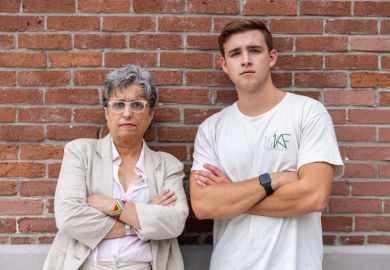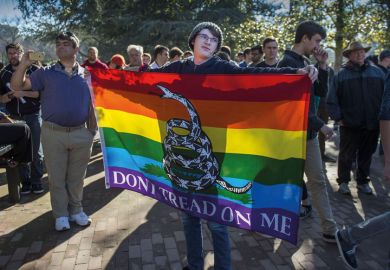About 200 Harvard University students gathered over the weekend for the campus’ first-ever Republican student conference, aimed more at unifying themselves than celebrating their movement’s moment of startling triumph over Ivy League leadership.
The inaugural Harvard Conservative and Republican Student Conference pulled together students from several right-of-centre groups, who heard a series of top political and business leaders detail their thinking and strategy in areas of economics, education and foreign policy.
The presenters included: Peter Thiel, the billionaire co-founder of PayPal and Palantir; US representatives Kevin Kiley and Dan Crenshaw; Kevin Hassett, a chair of the Council of Economic Advisers in the Trump administration now serving as a fellow in economics at Stanford University’s Hoover Institution; and Roger Severino, the director of the Office of Civil Rights in the Trump administration’s Department of Health and Human Services now serving as vice-president of domestic policy at the Heritage Foundation.
The conservative leaders repeatedly emphasised to the students the critical and outsized role that US universities in general, and Harvard in particular, play in shaping national culture; the disaster they see in the politically liberal pursuits of social equity; the need to give non-educators a much bigger role in deciding school policy at all levels in the US; and the need for conservatives to fight through means that include getting married and having many children.
Mr Thiel is known for offering promising young entrepreneurs $100,000 (£80,000) to skip college and build their own companies, and he offered the Harvard Republicans a keynote address that puzzled over the amount of concern Americans show for matters of social equity. He called it a “focus on victims” with biblical origins in the idea that Christ suffered persecution. “It’s not like this super weird new thing,” Mr Thiel said of the current era of “woke” politics. “It is maybe just one toggle switch away from Christianity.”
The conservatives – overwhelmingly white and male – gathered wearing suits and ties in a hotel conference room just across the street from the Harvard campus. Their event featured limited overt celebration of the ousting last month of Claudine Gay as Harvard’s first black president after a record short tenure of six months, in a moment instigated by her reluctance to criticise students protesting against Israel’s treatment and killing of Palestinian civilians.
A conference co-organiser, Michael Oved, is a third-year undergraduate and president of the Harvard Republican Club who began planning the event back in May, shortly before Professor Gay took office. Participants included his own club’s members, plus those of various school-based conservative student groups and The Harvard Salient, the university’s undergraduate conservative publication.
In an interview, Mr Oved waved off queries about specific political issues, including Professor Gay, Donald Trump or what the Harvard administration could be doing differently. “The purpose of the conference isn’t to discuss Claudine Gay,” he said. “The purpose of the conference is to bring together Republicans, to educate them, to equip them with the skills, with the information, with the tools, with the people that they need to excel, to succeed in life.”
The gathering was also a matter of showing pride on a campus where, in Mr Oved’s estimate, perhaps about 25 per cent of the student population shared conservative perspectives. “The purpose of the conference is less on specific current events within the university, and more so an effort not only to show us at Harvard, but also to show the world that there are young people who are Republicans, and we are proud,” he said.
“What this represents," said Mr Oved, part of a wider group that planned the event and chose its speakers, “is an effort among Republicans to galvanise the youth and to provide them with a forum to express their ideas, their beliefs, to reinforce those beliefs and perspectives, and to have the capacity, the willingness and the wherewithal to do so with dignity and without fear of repercussions.”
Register to continue
Why register?
- Registration is free and only takes a moment
- Once registered, you can read 3 articles a month
- Sign up for our newsletter
Subscribe
Or subscribe for unlimited access to:
- Unlimited access to news, views, insights & reviews
- Digital editions
- Digital access to THE’s university and college rankings analysis
Already registered or a current subscriber?








